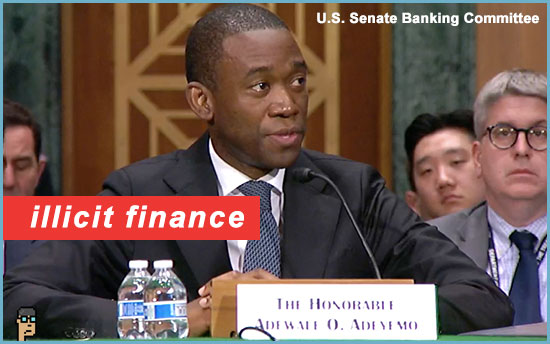With the “script” written in the previous 24 hours by prepared testimony, a Congressional letter and a draft of new anti-money laundering (AML) legislation for crypto, the Senate Banking Committee hearing titled, “An Update from the Treasury Department: Countering Illicit Finance, Terrorism and Sanctions Evasion,” with Deputy Treasury Secretary Wally Adeyemo and chaired by Senator Sherrod Brown (D, OH) got underway at 10 a.m. today.
See:
-
- The on-demand hearing broadcast here
- Deputy Secretary Wally Adeyemo’s prepared testimony. Download.
- Senators Thom Tillis (R, NC) and Bill Hagerty’s (R, TN) crypto illicit finance draft. Press release.
- Monday’s Congressional letter from Senator Elizabeth Warren (D, MA) to House Financial Services Committee leaders regarding the stablecoin bill. Via Politico.
Takeaways from the hearing:
-
- This was a brisk 90-minute hearing.
- Not every member of Senate Banking chose to participate such as Sen. Jack Reed (D, RI) of CANSEE, Sen. Cynthia Lummis (D, WY) or Sen. Bill Hagerty (R, TN).
- Chair Brown did not given any inkling about whether he had his own bill addressing digital assets and illicit finance.
- Ranking Member Tim Scott (R, SC) gave an impassioned defense of digital assets saying that they had become a “scapegoat” of the Biden Administration especially given how traditional finance methods were far larger than crypto when it came to illicit finance.
- Democrats were fairly united behind Democratic leadership positioning that crypto assets need to be addressed more aggressively by Treasury.
- Deputy Secretary Adeyemo seemed to suggest that more “tools” for Treasury as it related to crypto assets was about taking preventative measures even though he admitted a larger illicit finance problem currently exists through traditional finance means.
- The tools were initially shared in a term sheet last November and were re-emphasized – at a high-level – in Adeyemo’s prepared testimony beginning with sanctions of “foreign digital asset providers.”
- During her Q&A time, Senator Warren chose to emphasize the House stablecoin bill versus her own anti-money laundering bill. Her criticism of the House stablecoin effort makes sense in that it’s potential passage is more imminent than any crypto AML bill currently percolating across Congress. The stablecoin bill is seen as a potential threat to Dem leadership’s views about keeping crypto out of the U.S. financial system.
- At the hearing, the only Senate AML legislation focused on crypto that was discussed in any depth was by Sen. Tillis and his new bill – available as a discussion draft – co-sponsored by Sen. Hagerty.
- Coming out of this hearing, the next step perhaps lies with Treasury and its rulemaking capabilities. Treasury (and the Biden Administration) has “checked the box” and asked Congress for “tools” to address a crypto asset anti-money laundering threat. Now, it may do what it can with its own rulemaking which is outside of a Congress bogged down by a general election and politics.
- Nevertheless, Politico’s Eleanor Mueller reported on X that after the hearing, Chair Brown “says he is ‘hopeful’ he can introduce a bill soon that would give Treasury officials the new powers they asked for to prosecute illicit finance in crypto.”
Continue reading “Senate Banking Hearing On Illicit Finance Includes Stablecoin Focus”








